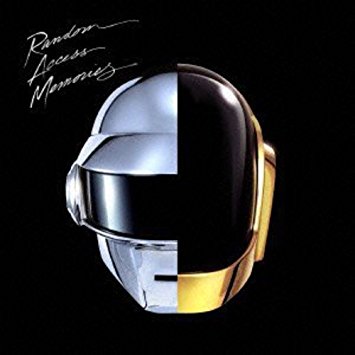This week Daft Punk’s Random Access Memories turns an incredible five years old. I grappled awkwardly with the record at the time – penning the below review for Time Out – and was both on and off the money. Yes, the future-disco aesthetic has not just aged better than expected, but been co-opted into the mainstream, while repeated listens have been rewarded with a sense of continuity holding the whole thing together – the necessary condition of an icon-in-waiting. But it’s instructive to be reminded the reason so many of us put the time it was a direct result of the colossal hype RAM received – an old-school record company backing of the kind it seems unlikely any act would receive even five years on. Anyway, here’s what I wrote.
It hasn’t been hard for both listeners and critics to interpret Random Access Memories as a stand against the state of modern music. With its five-year gestation period, huge budget, head-scratchingly diverse list of collaborators and – most of all – Daft Punk’s decision to ditch the electro-wizardry of their previous three albums in favour of recording real, live, veteran session players, it seemed the French duo’s enigmatic robot helmets were trying to communicate something. Something about the plasticity of music, perhaps; a barb in the back of the ‘EDM’ craze, which they arguably did more to inspire than anybody.
The epic, old-school publicity campaign did little to alter this perception, with short audio clips and behind-the-scenes studio footage teased out for months ahead of the LP’s release. When lead single Get Lucky, starring Pharrell Williams’ voice, finally dropped there was a moment of minor euphoria. Sure, this was a throwback alright, but a funky one with hip guitar playing and a chorus anyone on a dancefloor could get down to. But then there was a collective “huh?” as everyone who ran out to buy Random Access Memories off the back of that – or earlier hits like Around the World – tucked into the full album. It sure is a curious feast, both a knowing homage to ’70s disco and a vision of the future from the vantage of the past, splattered with orchestral interludes, solo piano improvs, an audio recording of the Apollo 17 space mission – and vocoders.
First, the positives: all that money was well spent – it sounds fantastic. The starring guests each leave an impressionable stamp. Over three tracks Nile Rodgers’ guitar playing is as sublime as iconic as ever. The Strokes’ frontman Julian Casablancas and house producer Todd Edwards both contribute vocals (to Instant Crush and Fragments of Time, respectively) which, while not outshining Pharrell’s, more than hold their own in unfamiliar climes. But other collaborations are less successful. It’s not clear where old school composer Paul Williams’ typically cinematic orchestral arrangements – nor classically minded pianist Chilly Gonzales’ winding solo spot – fit into Daft Punk’s twisted view of future disco. Worst still, wheeling out legendary pioneer Giorgio Moroder to talk about his life for the best part of nine minutes (over Giorgio by Moroder) may serve as an instructive history lesson, but is not likely to attract repeated listens. And so many competing vocalists mean the songs without a guest, and instead left to Thomas Bangalter and Guy-Manuel de Homem-Christo’s vocodered whines, feel somehow undercooked. Perfectly produced robo-pop perhaps, but lacking in squelch or soul.
RAM’s greatest failing, then, is simply that is lacks any cohesive thrust, or indeed the statement it’s been (perhaps unfairly) tasked with making. While it was no doubt an adventure to capture all these jarring elements, together they often add up to less than the sum of their parts, and you can’t quite help wondering how such canny musical minds could end up so creatively confused. What we’re left with is a strange culture clash of Daft Punk’s newfound nostalgic disco aesthetic, its old futuristic house-pop ways and a whole load of other weird stuff. Yet there’s no denying this record is an event – a flaming car crash far too fascinating to avert your eyes from.
